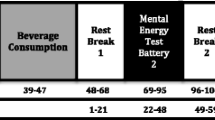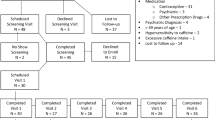Abstract
Nineteen healthy volunteers ingested 400 ml black tea, coffee, caffeinated water, decaffeinated tea or plain water on three occasions through the day (0900, 1400 and 1900 hours). A 2 × 2 factorial design with caffeine (0, 100 mg) and beverage type (water, tea) was employed, with coffee (100 mg caffeine) as a positive internal control, based on a five-way crossover. A psychometric test battery comprising critical flicker fusion (CFF), choice reaction time (CRT), short-term memory (STM) and subjective sedation (LARS) was performed at regular intervals throughout the day, and intensively so immediately following each beverage. Consumption of tea compared to water was associated with transient improvements in performance (CFF) within 10 min of ingestion and was not affected by the time of day. Caffeine ingestion was associated with a rapid (10 min) and persistent reduction in subjective sedation values (LARS), again independent of time of day, but did not acutely alter CFF threshold. Over the whole day, consumption of tea rather than water, and of caffeinated compared to decaffeinated beverages, largely prevented the steady decline in alertness (LARS) and cognitive capacity observed with water ingestion. The effects of tea and coffee were similar on all measures, except that tea consumption was associated with less variation in CFF over the whole day. No significant treatment effects were apparent in the data for the STM. Tea ingestion is associated with rapid increases in alertness and information processing capacity and tea drinking throughout the day largely prevents the diurnal pattern of performance decrements found with the placebo (no caffeine) condition. It appears that the effects of tea and coffee were not entirely due to caffeine per se; other factors either intrinsic to the beverage (e.g. sensory attributes or the presence of other biologically active substances) or of a psychological nature (e.g. expectancy) are likely to play a significant role in mediating the responses observed in this study.
Similar content being viewed by others
Author information
Authors and Affiliations
Additional information
Received: 18 September 1997/Final version: 16 February 1998
Rights and permissions
About this article
Cite this article
Hindmarch, I., Quinlan, P., Moore, K. et al. The effects of black tea and other beverages on aspects of cognition and psychomotor performance. Psychopharmacology 139, 230–238 (1998). https://doi.org/10.1007/s002130050709
Issue Date:
DOI: https://doi.org/10.1007/s002130050709




